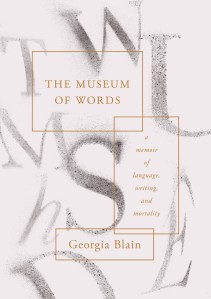
2017, 176 p.
Packing up an elderly parent’s house is hard. You are sorting, packing, throwing all those familiar markers of a life, acknowledging that they are worth nothing and yet knowing that they were treasured. You feel sad and guilty.
In her book ‘The Museum of Words’, Georgia Blain tells of packing up her mother’s house for sale. Her mother, author and journalist Anne Deveson, was still alive, but in care and oblivious to the practical financial arrangements that were being made around her. The personal stuff had been largely cleared away, and the house was being prepared for the open inspection, that odd state where a house has to be curated to look lived in , but not too lived in. In Anne’s study, there was a corkboard left on the wall, stripped bare when they were repainting. Georgia hastily found a pile of photos in a cupboard and began to decorate the board. Dogs, grandchildren, holiday photos, children’s photos, Georgia pinned them up. “I felt as if I was creating a museum of happiness” she told her daughter and husband.(p.48)
Blain has called this last book ‘The Museum of Words’, and in reading it you can’t help but think that this is Blain’s own act of pinning up her life. Dying with brain cancer, with a glioblastoma the size of a golf ball, she writes of the experience of her illness, threaded by perverse coincidence with the illnesses of her mentor, friend and human rights activist Rosie Scott, who was dying with exactly the same condition, and her mother who was dying with Alzheimers. She writes of herself as daughter to Anne and in turn, as mother to her daughter Odette. Men do not play a large part in the story. This book is in many ways a love letter to all three of these women, to the act of writing, and in her final paragraph, an assertion of gratitude for life itself.
The book is interspersed with photographs, which act as a way of telling when the words don’t come. There are spaces on the page, which I didn’t recognize as quickly as I might have in an e-book instead of a printed edition
In the foreword, written by her husband Andrew after her death, and in Blain’s book itself, there are several references to the increasing difficulty with writing that Blain experienced. You can sense that the flow is disrupted and that the sentences are perhaps less complex than they might otherwise have been. But most of all, I was left with my eyes brimming at the thought of her actually finishing the writing of this book and her decision as an author writing her own life to round it off and to write the final sentence before turning to the task of editing. Too young, too soon, too much left unwritten.
Sourced from : YPRL e-book
My rating: too hard to rate. In terms of emotional punch, though, 10/10
 I have registered this review with the Australian Women Writers Challenge.
I have registered this review with the Australian Women Writers Challenge.

Pingback: History Memoir and Biography Round Up: July 2018 | Australian Women Writers Challenge Blog
Pingback: Australian Women Writers Challenge 2018 completed | The Resident Judge of Port Phillip
Pingback: ‘Night Fishing’ by Vicki Hastrich | The Resident Judge of Port Phillip
Pingback: Six degrees of separation: from ‘What are you going through?’ by Sigrid Nunez to…. | The Resident Judge of Port Phillip